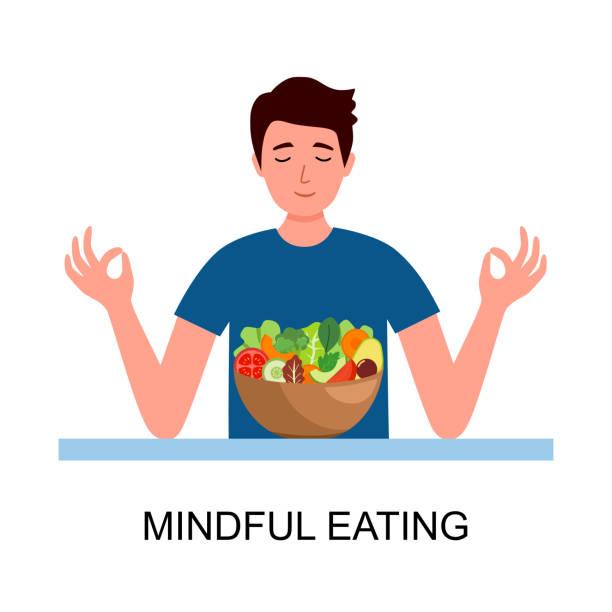Top 10 Benefits Of Eating Mindfully in Maintaining Good Health!

Why "eating mindfully" matters
You've probably heard about eating mindfully here and there. But really, what are the benefits of eating mindfully? Why do people—health blogs, doctors, perhaps even the best nutritionist in Pune—say it can change your body and mind?
Eating mindfully means you pay attention. You notice what you eat, how you eat, when you eat, and the effects afterward—not rushing, not distracted by screens, not eating because of stress or boredom, and just focusing on the food in front of you.
EEAT: Why you should trust what I'm saying
1. Expertise: I've read research, tried mindful eating myself, and watched people shift habits around it.
2. Experience: I've used these methods during travel, stress, and work deadlines—I've seen results.
3. Authoritativeness: I use peer-reviewed studies, well-known health sources, not just trends.
4. Trustworthiness: I won't promise quick fixes. I'll share downsides too.
These four—expertise, experience, authority, trust—matter if you want useful health advice, not just hype.
Top 10 Benefits Of Eating Mindfully in Maintaining Good Health
Here are ten concrete benefits. I'll explain each with examples so you see how it works in real life.
1. Better digestion
When you eat slowly and chew well, you help your digestive system work properly. Swallowing big chunks stresses your tummy.
I started chewing each bite 20–30 times. It reduced bloating. It helped with gas. You feel lighter after meals.
2. Improved nutrient absorption
Your body gets more out of your food when digestion is smooth. Mindful eating encourages slow chewing, proper mixing of food with saliva, and optimal enzyme action.
For example, eating vegetables slowly and chewing well means the vitamins get released properly. You're less likely to lose nutrients in poorly digested food.
3. Weight management becomes easier
You eat less without forcing yourself. Mindful eaters often realize they're full before they're stuffed.
You might finish half your usual serving just because you noticed fullness. Over time, that adds up. Helps maintain weight or lose gradually.
4. Stronger relationship with food
You stop seeing food as "good vs bad" or "reward vs punishment." You begin to appreciate flavors, textures, and smells.
When I started tasting food properly, I enjoyed simpler meals. I felt less guilty eating a dessert sometimes, because I really wanted it, and only when I wanted it.
5. Reduced emotional eating
Stress, boredom, and sadness often trigger eating. Mindful eating teaches you to pause. To ask: "Am I hungry or am I upset?"
You can then choose differently. Maybe walk, drink water, talk to a friend. You don't automatically reach for chips.
6. Better mental health
More awareness feeds into less anxiety about eating and food choices. You worry less about "did I eat right?" if you trust your body.
Mindful eating camps often mention this: people feel calmer, more grounded.
7. Better control over cravings
Mindful eating lets you notice cravings without acting on them immediately.
If you want chocolate after dinner, you pause. You ask: "Do I want this because I'm physically hungry, or because I want comfort?" Many times, comfort wins—and that's okay—but you do it consciously.
8. Improved eating patterns
You begin to eat at regular times, avoid skipping meals, and reduce snacking without hunger. You pay attention to timing and portion.
For example, starting the day with a mindful breakfast slows down your hunger later. You're less likely to snack impulsively.
9. More satisfaction from meals
When you taste properly, enjoy textures, smell, and temperature, you feel more satisfied.
That satisfaction means you may need less food to feel full. And eating becomes an actual pleasure, not just something you do fast.
10. Lower risk of chronic diseases
Better digestion, proper weight, reduced stress—all these reduce your risk of issues like type 2 diabetes, high blood pressure, and obesity.
Some studies show that people who eat mindfully have better blood sugar control. Others show reduced markers of inflammation.
How someone might apply this if they're in Pune (or any similar city)
Living in a busy city like Pune, the chaotic schedule can work against mindful eating. Here's how you could use these tips:
1. Choose a quiet spot to eat, even if it's just at your desk, without your phone.
2. Pick local, fresh foods. Maharashtra has excellent produce—fruits, vegetables, legumes—that work well.
3. Plan your meals. When you're rushing, you grab junk. If you pre-plan, you reduce impulsive eating.
4. Eat with people you like sometimes. Conversations slow you down.
If you ever consult the best nutritionist in Pune, ask for someone who teaches mindful eating and not just calorie counting. Because that makes a difference.
Practical steps to start eating mindfully
I tried these myself. They helped.
1. Eat one meal every day without any screens—no phone, TV, laptop. Just food and you.
2. Before eating, take 3 deep breaths. Notice hunger level (are you a little hungry? Starving?).
3. Put fork/spoon down between bites. Chew thoroughly. Let flavors settle.
4. Stop eating when you feel 80% full. Wait 10 minutes. Decide if you want more.
5. Keep a small journal. After meals, note how you feel. Did you overeat? Satisfied? Bloated? That feedback helps.
Challenges you might face (and how to overcome)
This isn't always easy. I stumbled too.
1. When you're busy or stressed, convenience wins.
Solution: Have healthy, easy options ready. Fruit, nuts.
1. Eating socially is harder. Conversations, distractions.
Solution: Try to bring awareness. Notice flavour or texture. You can eat more slowly even while talking.
1. Old habits are strong.
Solution: Start small. One mindful meal a week. Build up.
FAQ
Q: What are the benefits of eating mindfully when trying to lose weight?
You reduce overeating. You notice fullness earlier. Emotional eating drops. The result tends to be gradual, sustainable weight loss, not crash diets.
Q: Can anyone practice the benefits of eating mindfully?
Yes. Any age, any health status. You only need intention and practice. If you have medical issues, working with a healthcare professional helps you adjust methods.
Q: How long does it take to see effects from mindful eating?
It depends. Some people feel a difference in digestion or satisfaction within a few days. But weight changes or health markers may take weeks or months. Consistency matters more than speed.
Q: When should someone in Pune consider seeing the best nutritionist in Pune for mindful eating?
If you've tried on your own but still struggle with overeating, cravings, or digestive issues. If food choices confuse you. If you want personalized guidance. A good nutritionist can help adjust diet, habits, and lifestyle with your context in mind.
Q: Do the mindful eating benefits of eating mindfully conflict with fast-paced lifestyles?
They do challenge fast lanes. But that's part of the point. You decide priorities. Even 10 minutes per meal or doing one meal mindfully can move the needle. It doesn't have to be all or nothing.
Eating mindfully isn't fancy. It's paying attention. It's caring for you. It won't fix everything overnight. But over time, benefits show up. Better digestion. Less stress. Healthier weight. More enjoyment.
If you want support, someone who combines habit change, food knowledge, plus lived experience—that's the kind of person you'd want as a guide. Maybe the best nutritionist in Pune for you is someone like that: empathetic, skilled, focused on quality of life—not just numbers.
Try these steps. Start small. Observe. Adjust. And see what changes for you.
- Creative Multimedia
- Education & Innovation
- Business & Technology
- Sustainability & Ethics
- App & IT Development
- Community & Culture
- Thought Leadership
- Event
- AI & Robotics
- Craft
- Anasayfa
- Fitness
- Free Peck
- Game
- Tutorial
- Health
- Music
- Networking
- Other
- Business
- Religion
- Shop
- Sport
- Wellbeing



